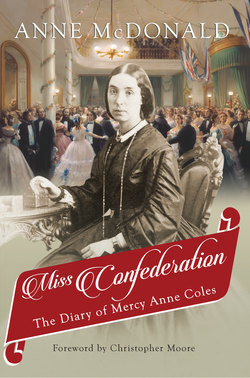Читать книгу Miss Confederation - Anne McDonald - Страница 5
На сайте Литреса книга снята с продажи.
Foreword
Оглавлениеby Christopher Moore
For years I had a little crush on Miss Mercy Coles, even when I only knew her diary from nasty print-outs and photocopies from the archives.
When a well-brought-up Island girl would let me read her private thoughts, how could I not be smitten? The lively little scenes she conjures up, the bitter disappointments she confesses, the sharp opinions she offers — they all captivated me.
How could my heart not melt when illness strikes her down just before the elegant ball she has set her heart on? A triumphal appearance might have changed her life. Alas, she missed it.
How could I resist her vivid pen sketches of the great men of confederation? John A. Macdonald brings her dessert. Charles Tupper bustles in with his medical bag. D’Arcy McGee takes her to dinner and then drinks too much. Her own politician father dances himself into a lather. All this is livelier than, say, the debate over Number 8 of the Quebec Conference’s seventy-two constitutional resolutions. Such matters Mercy declines to mention, though her father is in the thick of them, and one senses she knows a good deal about them.
But … I was being selfish, too. Mostly, I plundered what Mercy would tell me. I was greedy for the glimpses she gave of history in the making. Really, I was not paying attention to her hopes and dreams at all. I was just there to grab what I could use.
Men!
Anne McDonald taught me the error of my ways. It was from her sensitive reading in this book that I came truly to appreciate Mercy Anne Coles, Miss Confederation. It is Anne McDonald who listens for what a young woman of the 1860s will not say in words. She teaches us how to see all that is hiding between Mercy’s lines.
Any reader can note that Leonard Tilley, the premier of New Brunswick, is a fellow passenger on the Coles family’s slow train to Quebec City. Anne McDonald sees and shows us the courting rituals that may be linking Mercy to this dynamic, and youngish, widower. And when the Coles family dines with John A. Macdonald, also a widower, she is the one who asks whether Mercy considers him as husband material. Those ambitious young political aides constantly about the hotel parlour — do they stand a chance at all?
Anne McDonald lets us see that the gender politics around the Quebec Conference are at least as subtle as the constitutional partnership that is being negotiated simultaneously.
Mercy Anne Coles’s diary is far and away the most personal account we have of the events surrounding the making of Canada’s confederation in 1864. Anne McDonald, herself an Island girl, almost, is our ideal guide to it. She unobtrusively gives us all the background we might want. More than that, she listens to Mercy. She suggests what we might look for, just below the surface of the text.
Christopher Moore has twice won the Governor General’s Literary Award. He is the author of 1867: How the Fathers Made a Deal and Three Weeks in Quebec City: The Meeting That Made Canada, among many other works. Mercy Coles plays cameo roles in both.
